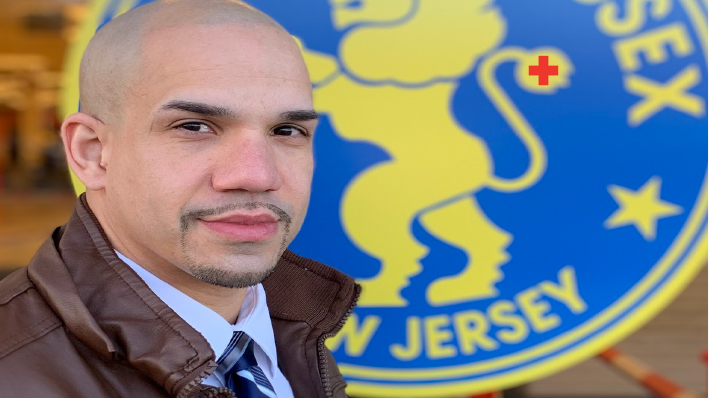
Courtesy of N. Gonzales, Jr.
Offering not the least hint of his past, Nelson Gonzalez Jr. arrives for work clean shaven, energetic and in neatly pressed attire. He exudes a distinct air of positivity and politeness as he addresses everyone as Sir or Ma’am.
PAST & PRESENT
By any standard, Mr. Gonzalez is a true professional working in the healthcare industry.
While working at a Covid-19 vaccination site, I got to know this inconspicuous looking young man in his mid-30s and was shocked to learn he served 17 years in prison for felony aggravated manslaughter.
FIRST IMPRESSIONS
Nelson is warm and outgoing. His demeanor definitely doesn’t reflect his dark, violent past. Nowhere in his casual disposition could I discern a trace of gangster nor his 17 years behind bars.
In many ways, Nelson appears entirely rehabilitated – a product of the New Jersey Department of Corrections. After a series of conversations and interviews with him, the term ‘corrections’ is given critical nuance.
His path to successful rehabilitation, like those for thousands of other incarcerated Americans, did not pass through his period of corrections but rather in spite of it.
SELF DETERMINATION
I was fortunate enough to speak at length with Nelson Gonzalez in an attempt to understand his unique experience in a broader context; one that speaks to the corrupted and self-defeating nature of the American system of incarceration.
Nelson’s hopeful path is also a testament to a solution: therapy – a light at the end of the tunnel for the many young men who, upon release, find themselves at square one.
BAGGAGE
Nelson suffered from a broken home. His birth father, a veteran, was plagued by recurring heroin abuse and his mother raised several children all while in the company of her emotionally and physically abusive new husband.
Nelson was not spared any abuse from his stepfather, who regularly berated and beat him as a young child. These beatings were almost always accompanied by vicious slurs and verbal abuse.
Needing to escape the wrath of his stepfather, he moved to Florida on his own.
WRONG TRACK
With no income, support or education, an unfortunate fate befell Nelson at 17 years old. In 2003, he was arrested with eighty-seven bags of heroin. The income from these drugs had been his and his little sister’s lifeline.
The money from his drug dealing was equally used to support his 21-year-old girlfriend who had four children.
The relationship, between a minor and an adult, led Nelson to a series of legal troubles. These were eventually used in his sentencing to establish a ‘criminal pattern’ that would see him tried as an adult.
DEEP TROUBLE
At 17, his childhood ended with a conviction and a twenty-year sentence for aggravated manslaughter following an armed robbery gone awry.
Today, Nelson does not attempt to excuse his actions with his childhood traumas. His drug charges, domestic violence issues and ultimate aggravated manslaughter charge cannot be justified by his past.
NO EXCUSES
Rather, Nelson says: “it doesn’t excuse me… but it helps to explain”. It wasn’t until after a year of therapy, years in ‘lock-up’ and even solitary confinement that he was able to begin to unpack his past.
Up until that point, Nelson had been far from a perfect inmate. A member of a prominent prison gang, he continued his trend of criminal violence until he landed in solitary confinement.
HIS PERSONA CRACKED
During his time in ‘the hole’, Nelson’s tough persona was cracked. Eventually, his psychological state diminished to the point of becoming suicidal. As per prison policy, Nelson could now be moved to the MSU, the Mental Stabilization Unit.
For the next two years, he received intense therapy in group and private settings. Removed for the first time in his life from the violence, crime and gangs in ‘lock-up’, Nelson was able to lower his guard.
There were no more beatings from his father, no more drugs to sell, no more arguments with his partner, no more exposure to gangs.
finding help
With the help of his psychologist, Nelson was offered a luxury afforded to few other inmates: vulnerability.
PSYCHOLOGICAL REHAB
I had the opportunity to speak with Nelson’s psychologist, Dr. Dana Gabriel.
Dr. Gabriel not only treated many inmates in some of New Jersey’s toughest prisons but also co-developed a psychological rehabilitation program. It focused on screening and identifying inmates who demonstrated potential for intensive therapy.
Prior to Dr. Gabriel’s initiative, mental health services were reserved for inmates placed in the MSU.
therapy in cells
With little to no funding and no concerted effort to develop Dr. Gabriel’s program, she and other experts were often left trying to conduct screenings and therapy sessions in cells.
These places were surrounded by the very environment from which Dr. Gabriel sought to dissociate her patients.
SWITCHING DIRECTIONS
Luckily for Nelson, he underwent intensive individual and group therapy.
Within a year of his therapy, Nelson attained his GED (General Educational Development) diploma, began studying psychology and made a critical decision in his rehabilitation: he left his gang.
Although still in prison, his decision to divorce himself from the gang that had let him develop a criminal social identity was paramount to his development.
AT A PRICE
His breakthrough and emancipation, however, came at a price to the tune of relentless beatings. In spite of these beatings and despite his violent surroundings, Nelson’s therapy had given him the power to reshape his identity.
a new beginning
For the remainder of his sentence, Nelson was nothing short of a model inmate who even began to promote Dr. Gabriel’s program inside the prison in an attempt to help other inmates follow his own path.
Today, Nelson is working towards his own psychology degree with the hope of opening up a psychological assistance program for newly released inmates.
RATE OF SUCCESS
Despite a lack of funding and personnel, Dr. Gabriel’s initiative saw major success. According to her, of every inmate taken from administrative segregation – home to the most violent inmates – some 75% never reoffended in prison. To her knowledge, this success rate is complimented by the fact that few participants reoffend after release.
Dr. Gabriel even mentioned that many former patients have kept in touch and have pursued further psychological assistance in the process of their rehabilitation. No doubt, Nelson Gonzalez was one of Dr. Gabriel’s success stories.
A DIFFERENT PERSON
Admittedly, when Nelson first told me that he had served 17 years for aggravated manslaughter I was shocked and disturbed. The nature of the crime was certainly disconcerting and yet what seemed to shock me most was how I would never have attributed such a past to the hardworking, warm and kind man I came to know.
In other words, my shock was in part due to the fact that I would never have imagined that a man like Nelson could be rehabilitated. Dr. Gabriel was also significantly impressed with Nelson’s progress – but was not surprised.
TIME FOR A CHANGE
Unfortunately, the program that brought Nelson to Dr. Gabriel is exceedingly rare in American prisons. Despite insanely high recidivism rates and a growing American prison population, prisons have not adopted strategies that have yielded strong preliminary results.
The American recidivism rate, measuring the rate at which inmates reoffend, is considered the highest in the world.
A program that provided psychological services to inmates with high potential for rehabilitation was so groundbreaking that Dr. Gabriel and her partner were invited to the National Commission on Correctional Health Care in Las Vegas to present the idea, research and program.
NO LONGER THE WORST
In other parts of the world, such as Scandinavian countries and Germany, Dr. Gabriel’s program would be the norm. Prisons like the German Schwalmstadt Prison have centered their entire corrections focus on therapy and psychology.
The prison houses some of Germany’s most violent criminals, many of whom make administrative segregation in New Jersey look like the minor leagues of heinous crimes.
a role in the community
Despite some inmates being deemed ‘beyond rehabilitation’, each inmate is given a full range of therapy and social work as well as a productive role in the Schwalmstadt prison community. Thanks to such programs, and other mental health services universally offered to inmates, the German recidivism rate has dropped to a world-leading 33%.
PSYCHOLOGICAL PROSPECTS
When I raised the prospect of instituting widespread psychological approaches and programs in the American Departments of Corrections, Dr. Gabriel was convinced that while the task appears Herculean, it is entirely feasible.
a philosophical choice
Given the roughly 90-billion-dollar annual expenditure on American prisons, the lack of proven, effective mental health services is reflective of a philosophical choice rather than mere budget constraints. To many in the prison reform movement, the Department of Corrections is nothing more than a system for punishment – and for many Americans, this is the way they prefer justice to be.
It was when discussing this prison philosophy with Nelson that we came to a harsh, dark reality. While Dr. Gabriel attributed much of Nelson’s success to his willingness and drive to rehabilitate, she knew that had it not been for his therapy and participation in her programs, the odds of him and I having that conversation would be slim to none.
A CHALLENGE TO REFRAIN
Merely refraining from crime and violence was a challenge for Nelson as he underwent rehabilitation. Without being able to divorce himself from the cut-throat environment of prison during his therapy sessions, Nelson is unsure if he would be a free man, or even alive, today.
Unfortunately, the dominant majority of the over 2.3 million Americans incarcerated are never given Nelson’s chance to break their criminal identities. Instead, a large segment of those inmates become more violent and dive deeper into a life of crime as a mechanism for survival while behind bars.
About the Article
A look at the self-growth of a front-line worker overcoming the horrors of his past.



